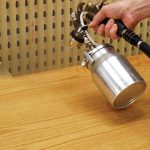We may receive a commission when you use our affiliate links. However, this does not impact our recommendations.

We’re interviewing makers from across the country. Today we’re featuring Trey Lord, a woodworker and entrepreneur owner from Washington, D.C.
How did you get started woodworking? Who were your mentors?
Honestly just kind of picked it up, and never had a single mentor that I could name. I learned some here and there as a kid doing pinewood derby cars and in middle school woodshop class. In high school I took a sculpture art class and decided to try and replicate our class ring out of a white oak stump and learned by doing with the tools available, mostly chisels.
During a lull in my regular professional career, I started doing paid woodworking projects mostly by overpromising and figuring out how to do it later. So mostly, I’d say my mentor was overconfidence, hubris, YouTube, and an excuse to buy more and better tools.
 What do you think is your best or favorite work? What kind of work do you do the most?
What do you think is your best or favorite work? What kind of work do you do the most?
I love live-edge pieces, whether its a charcuterie board, a desk, a bookcase, or a dining table. My day job is in the forest conservation and natural climate solutions world, so I spend a lot of time thinking, talking, and writing about trees and their inherent value. I love nothing more than to use the natural curves and shapes the tree takes to remind me of where the wood actually comes from. While the woodgrain itself often guides the ease and precision of a plane or a joint, it also shows its character and is further projected in its live edge. In the live-edge pieces I’ve made for myself, I often trace the grain and look for parallels with the live-edge, trying to find a pattern in the parallels.
I do mostly furniture – tables, desks, beds, nightstands, etc. I have recently a lot of built-ins, which I thoroughly don’t enjoy, but can justify a much higher fee. Even so, way too much big box plywood.
 What advice would you give to someone that wants to start woodworking or pursue it as a profession?
What advice would you give to someone that wants to start woodworking or pursue it as a profession?
Whether its a build, a joint, a glue up, etc, look it up, think it through, and give it a try. Dont be afraid to fail. You will. Often.
Be overconfident that you can do it, because eventually you will.
Also, don’t compare yourself to store-bought furniture. No one else will.
What’s your best hands-on tip or woodworking technique?
Manage dust. It’ll throw absolutely everything off, and once you start to allow pockets in corners of your shop, it’ll throw you off too. You’ll start accepting metaphorical pockets of dust in your work, in your car, in your foyer, and in your nose (lots of buggers). That being said, this is an aspiration. My shop is dusty as hell.
Is there anyone you’d like to shout-out or recommend we follow? Who inspires you? (Doesn’t have to be woodworking related, either.)
Two great DC woodworkers; Adam Godet www.godetfurniture.com and Jordan Hamlett Sanders @jordanhamlettsanders.
See more of Trey’s work on Instagram @districtreclaimed



This interview was lightly edited for clarity.
Here are some supplies and tools we find essential in our everyday work around the shop. We may receive a commission from sales referred by our links; however, we have carefully selected these products for their usefulness and quality.








